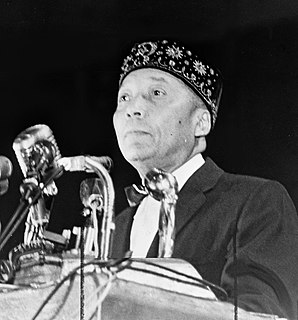Radical Islamism may refer to:
| | This disambiguation page lists articles associated with the title Radical Islamism. If an internal link led you here, you may wish to change the link to point directly to the intended article. |
Radical Islamism may refer to:
| | This disambiguation page lists articles associated with the title Radical Islamism. If an internal link led you here, you may wish to change the link to point directly to the intended article. |
The Five Pillars of Islam are some basic acts in Islam, considered mandatory by believers, and are the foundation of Muslim life. They are summarized in the famous hadith of Gabriel. The Sunni and Shia agree on the essential details for the performance and practice of these acts, but the Shia do not refer to them by the same name. They make up Muslim life, prayer, concern for the needy, self-purification, and the pilgrimage, if one is able.

Jinn, also Romanized as djinn or Anglicized as genies, are supernatural creatures in early pre-Islamic Arabian and later Islamic mythology and theology. Like humans, they are created with fitra, neither born as believers nor as unbelievers, but their attitude depends on whether they accept God's guidance. Since jinn are neither innately evil nor innately good, Islam acknowledged spirits from other religions, and was able to adapt spirits from other religions during its expansion. Jinn are not a strictly Islamic concept; they may represent several pagan beliefs integrated into Islam.

Islamism is a concept whose meaning has been debated in both public and academic contexts. The term can refer to diverse forms of social and political activism advocating that public and political life should be guided by Islamic principles or more specifically to movements that call for full implementation of sharia. It is commonly used interchangeably with the terms such as political Islam or Islamic fundamentalism, giving this term more than one sense and referring to different concepts. In academic usage, the term Islamism does not specify what vision of "Islamic order" or sharia is being advocated, or how the advocates intend to bring about that vision. In Western mass media it tends to refer to groups whose aim is to establish a sharia-based Islamic state, often with implication of violent tactics and human rights violations, and has acquired connotations of political extremism. In the Muslim world, the term has positive connotations among its proponents.

Muhammad was an Arab religious, social, and political leader and the founder of Islam. According to Islamic doctrine, he was a prophet, sent to preach and confirm the monotheistic teachings of Adam, Abraham, Moses, Jesus, and other prophets. He is believed to be the final prophet of God in all the main branches of Islam, though some modern denominations diverge from this belief. Muhammad united Arabia into a single Muslim polity, with the Quran as well as his teachings and practices forming the basis of Islamic religious belief.

Muslims are people who follow or practice Islam, a monotheistic Abrahamic religion. The derivation of "Muslim" is from an Arabic word meaning "submitter ". Muslims consider the Quran, their holy book, to be the verbatim word of God as revealed to the Islamic prophet and messenger Muhammad. The majority of Muslims also follow the teachings and practices of Muhammad (sunnah) as recorded in traditional accounts (hadith).

Malcolm X was an African American Muslim minister and human rights activist who was a popular figure during the civil rights movement. He is best known for his time spent as a vocal spokesman for the Nation of Islam.

The Nation of Islam (NOI) is an African-American political and new religious movement, founded in Detroit, Michigan, United States, by Wallace Fard Muhammad on July 4, 1930. Its stated goals are to improve the spiritual, mental, social, and economic condition of African Americans. Its official newspaper is The Final Call. In 2007, the core membership was estimated to be between 20,000 and 50,000.

Sayyid Ruhollah Musavi Khomeini, also known in the Western world as Ayatollah Khomeini, was an Iranian politician, revolutionary, and cleric. He was the founder of the Islamic Republic of Iran and the leader of the 1979 Iranian Revolution, which saw the overthrow of the last Shah of Iran, Mohammad Reza Pahlavi, and the end of the 2,500-year-old Persian monarchy. Following the revolution, Khomeini became the country's Supreme Leader, a position created in the constitution of the Islamic Republic as the highest-ranking political and religious authority of the nation, which he held until his death. Most of his reign was taken up by the Iran–Iraq War of 1980–1988. He was succeeded by Ali Khamenei on 4 June 1989.
Shia Islam or Shi'ism is one of the two main branches of Islam. It holds that the Islamic prophet Muhammad designated Ali ibn Abi Talib as his successor and the Imam after him, most notably at the event of Ghadir Khumm, but was prevented from succeeding Muhammad as the leader of all Muslims as a result of the choice made by Muhammad's other companions at Saqifah. This view primarily contrasts with that of Sunni Islam, whose adherents believe that Muhammad did not appoint a successor before his death and consider Abu Bakr, who was appointed caliph by a group of senior Muslims at Saqifah, to be the first rightful caliph after Muhammad. A person observing Shia Islam is called a Shi'ite or Shi'i.

Sufism, also known as Tasawwuf, is mysticism in Islam, "characterized ... [by particular] values, ritual practices, doctrines and institutions". It is variously defined as "Islamic mysticism", "the inward dimension of Islam" or "the phenomenon of mysticism within Islam". Sufism began very early in Islamic history and represents "the main manifestation and the most important and central crystallization of" mystical practice in Islam. Practitioners of Sufism have been referred to as "Sufis".
Sharia, Islamic law, or redundantly Sharia law, is a religious law forming part of the Islamic tradition. It is derived from the religious precepts of Islam, particularly the Quran and the hadith. In Arabic, the term sharīʿah refers to God's immutable divine law and is contrasted with fiqh, which refers to its human scholarly interpretations. The manner of its application in modern times has been a subject of dispute between Muslim fundamentalists and modernists.

Sunni Islam is the largest denomination of Islam, followed by 85–90% of the world's Muslims. Its name comes from the word Sunnah, referring to the behaviour of Muhammad. The differences between Sunni and Shia Muslims arose from a disagreement over the succession to Muhammad and subsequently acquired broader political significance, as well as theological and juridical dimensions. According to Sunni traditions, Muhammad designated Abu Bakr as his successor. This contrasts with the Shia view, which holds that Muhammad announced his son-in-law and cousin Ali ibn Abi Talib as his successor. Political tensions between Sunnis and Shias continued with varying intensity throughout Islamic history and have been exacerbated in recent times by ethnic conflicts and the rise of Salafism and Wahhabism.

The Quran, also romanized Qur'an or Koran, is the central religious text of Islam, believed by Muslims to be a revelation from God (Allah). It is widely regarded as the finest work in classical Arabic literature. It is organized in 114 chapters, which consist of verses.

Yusuf Islam, commonly known by his stage name Cat Stevens and later Yusuf Islam, Yusuf, and Yusuf/Cat Stevens, is a British singer-songwriter and multi-instrumentalist. His musical style consists of folk, pop, rock, and, in his later career, Islamic music, before returning to secular music in 2006. He was inducted into the Rock and Roll Hall of Fame in 2014.

The terms Muslim world and Islamic world commonly refer to the Islamic community, which is also known as the Ummah. This consists of all those who adhere to the religion of Islam, or to societies where Islam is practiced. In a modern geopolitical sense, these terms refer to countries where Islam is widespread, although there are no agreed criteria for inclusion. The term Muslim-majority countries is an alternative often used for the latter sense.

Elijah Muhammad was a religious leader who led the Nation of Islam (NOI) from 1934 until his death in 1975, and was known as The Messenger of Allah (God), to the Nation of Islam believers. Muhammad was also the teacher and mentor of Malcolm X, Louis Farrakhan, Muhammad Ali, and his own son, Warith Deen Mohammed.

A caliphate is an Islamic state under the leadership of an Islamic steward with the title of caliph, a person considered a politico-religious successor to the Islamic prophet Muhammad and a leader of the entire Muslim world (ummah). Historically, the caliphates were polities based on Islam which developed into multi-ethnic trans-national empires. During the medieval period, three major caliphates succeeded each other: the Rashidun Caliphate (632–661), the Umayyad Caliphate (661–750), and the Abbasid Caliphate (750–1517). In the fourth major caliphate, the Ottoman Caliphate, the rulers of the Ottoman Empire claimed caliphal authority from 1517. Throughout the history of Islam, a few other Muslim states, almost all hereditary monarchies such as the Mamluk Sultanate (Cairo) and Ayyubid Caliphate, have claimed to be caliphates.
Islam is an Abrahamic monotheistic religion teaching that Muhammad is a messenger of God. It is the world's second-largest religion with 1.9 billion followers or 24.9% of the world's population, known as Muslims. Muslims make up a majority of the population in 49 countries. Islam teaches that God (Allah) is One, Merciful, All-Powerful, and Unique, and has guided humanity through prophets, revealed scriptures, and natural signs. The primary scriptures of Islam are the Quran, believed to be the verbatim word of God, as well as the teachings and actions of Muhammad.

The Islamic State of Iraq and the Levant, also known as the Islamic State of Iraq and Syria, officially known as the Islamic State (IS) and also known by its Arabic acronym Daesh, is a militant Islamist group and a former unrecognized proto-state that follows a fundamentalist, Salafi jihadist doctrine of Sunni Islam. ISIL was founded in 1999 by Jordanian Salafi jihadist Abu Musab al-Zarqawi under the name Jama'at al-Tawhid wal-Jihad and gained global prominence in early 2014 when it drove Iraqi government forces out of key cities in its Western Iraq offensive, followed by its capture of Mosul and the Sinjar massacre.

Ahmadiyya, officially the Ahmadiyya Muslim Community or the Ahmadiyya Muslim Jama'at, is an Islamic revival or messianic movement originating in Punjab, British India, in the late 19th century. It was founded by Mirza Ghulam Ahmad (1835–1908), who claimed to have been divinely appointed as both the Promised Mahdi and Messiah expected by Muslims to appear towards the end times and bring about, by peaceful means, the final triumph of Islam; as well as to embody, in this capacity, the expected eschatological figure of other major religious traditions. Adherents of the Ahmadiyya—a term adopted expressly in reference to Muhammad's alternative name Aḥmad—are known as Ahmadi Muslims or simply Ahmadis.